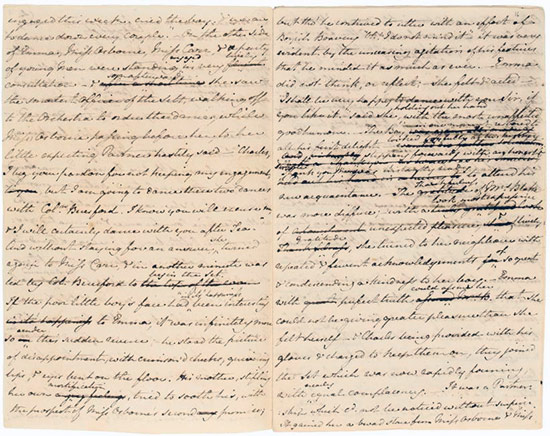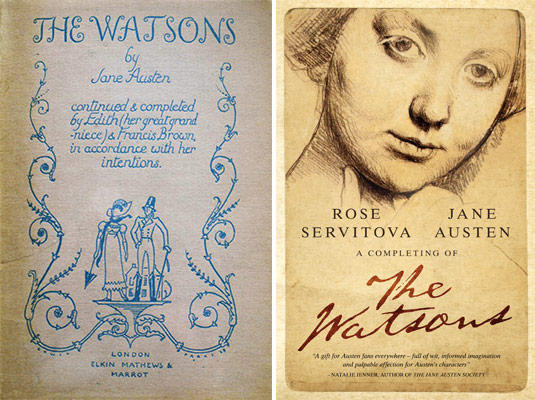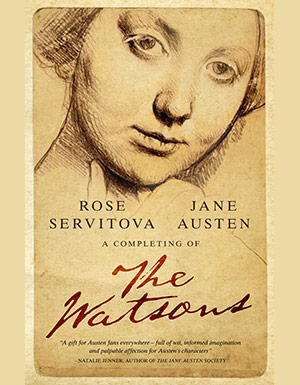It is a truth universally acknowledged that British period drama fans must be in want of a new Jane Austen adaptation. And by new, we mean something really fresh, like say, a television mini-series or feature-length film shaped from Austen’s unfinished novel The Watsons.

To help keep this site running: Willow and Thatch may receive a commission when you click on any of the links on our site and make a purchase after doing so.
In 2018 English playwright Laura Wade skillfully adapted The Watsons for the stage, and over the years many authors have tried their hand at completing this work in book form, including Austen’s niece Catherine Hubback with The Younger Sister.

Among the other writers to take on the challenge is Ireland’s Rose Servitova, author of The Longbourn Letters – The Correspondence between Mr Collins & Mr Bennet.
After her great success with the Pride and Prejudice variation, Servitova wrote A Completing of The Watsons (2019), an equally witty and charming tale of four sisters seeking security, love and happiness in a world where the most important decisions affecting their lives, are not always theirs to make.
With all the time she’s spent immersed in the story, we thought it fitting to ask Servitova if she thinks The Watsons should be the next Austen screen adaptation. Here’s what she had to say.
When news first emerged that the man who flung Colin Firth into a lake at Netherfield was to write a screenplay of Jane Austen’s unfinished Sanditon for ITV/PBS, bone-china cups crashed to the floor.
Whispering could be heard behind screens, episodes of hysteria were reported by waiters serving afternoon tea and social media, generally, lost the run of itself.
Andrew Davies, who breathed screen life into such classics as Vanity Fair, Middlemarch, Persuasion, Les Miserables, Emma as well as Pride and Prejudice and may be seen as every adaptation’s dream ‘go-to’ screenwriter, had taken up his quill again and we, in the period drama world, collectively gasped.
But while the majority of those gasps were “please don’t F*** this up, Mr Davies,” a smaller number were of another variety: “WHAT!!! Jane Austen had unfinished novels? I’m a Janeite and I’ve watched every version of the adaptations of her novels to stage and screen and I’ve never heard of them. I own a bonnet and cape, follow Lucy Worsley on Twitter, drink very strong tea and once stroked the walls of her former home in Bath. If there were other Austen novels floating about, I think I’d know about them.”
So why did Sanditon (approx. 24,000 words) and The Watsons (approx. 18,000 words) escape our attention and fail to make their way to screen while Austen’s other works were repeatedly adapted (there are reputedly over seventeen “Pride and Prejudice” movies since 1938).
The main reason is that, at only a few chapters, they have not been printed and circulated to the extent of her complete works. How can a morsel of a book become popular? Where these fragments have been published and read, they largely leave a strange taste in our mouths. We don’t tend to enjoy getting a sniff of a potentially great story only to have it snapped away from us mid-paragraph, leaving us to eternally wonder where the author was going with it.
Even for screen adaptation purposes, this is a challenge. As Andrew Davies said of adapting Sanditon in The Art of Screen Adaptation by Alistair Owen (Creative Essentials, 2020)
I only found enough material in the novel for half of the first episode… all she (Austen) does is introduce the characters and give us the setting – but what characters and what a setting…
And to his credit, Davies was not deterred from picking up where Austen left off.
It would be remiss of me not to mention, at this point, director and Oscar nominated screenwriter, Whit Stillman, who adapted Austen’s novella Lady Susan to create Love and Friendship.
Unpublished until 1871, many decades after the death of Austen, Lady Susan is of a similar length to Sanditon and also largely overlooked in favour of her six best known works. The edge that Lady Susan has, however, over Sanditon is that despite its short length, it is a complete work, full of colourful characters, an engaging plot and a fully formed, bewitching leading lady.
But what of that other neglected, semi-formed creation of Austen’s imagination? What of The Watsons?
What shall we do now when this remains the only Austeno-novelo-incompleto that has not graced our screens? Should we not kick and scream that we have been deprived too long? Who will take up this masterpiece-in-waiting? Those who have proven themselves in the past – Emma Thompson, Whit Stillman, Autumn de Wilde, Roger Michell, Joe Wright – or some, brave newcomer to Austen?
Despite being the shorter of the two unfinished works, The Watsons gives, in my opinion, many more clues as to what was to become of the story and characters. And, we are aided by Austen’s own plans for The Watsons which she apparently disclosed to her sister Cassandra and were mentioned to other family members, eventually revealed to us in her nephew, Edward Austen-Leigh’s A Memoir of Jane Austen (1869).
Armed with much of this information, some few brave souls even attempted to complete it themselves (cough, cough).
In The Watsons, we can see where Austen was headed. She plants quantities of information in the opening chapter alone using a clever narrative device: one sister telling the other much of what’s occurred since they last met fourteen years before. Elizabeth Watson drives her sister, Emma, into town in the family’s “old chair” so Emma might attend a ball.
She, and Austen, uses this opportunity to fill Emma (and us) in on all she’s missed out in the locality, the many personalities she will meet and their back stories. We learn of deceit, disappointment in love, a selection of eligible men and the choices facing women without fortune.
In those few chapters, we see themes close to Austen’s heart and touched upon in her other works. In The Watsons our heroine, Emma Watson, returns penniless to her family home after many years with her wealthy and indulgent aunt. Now more refined than her siblings, she is shocked by her sisters’ flagrant and desperate attempts to ensnare a husband.
To the surprise of the neighbourhood, Emma immediately attracts the attention of eligible suitors –notably the socially awkward Lord Osborne, heir to Osborne Castle– who could provide her with a home and high status if she is left with neither after her father’s death. She has also attracted the attention of Mr Howard, curate and friend of the Osbornes.
Despite a loving father and a kind sister, in Elizabeth, Emma often meets with judgement, interference and selfishness in other family members which leaves her wondering if she can do what is right in their eyes without creating a greater evil in her own.
In such a short fragment, we still encounter preoccupations and characteristics found elsewhere in Austen’s work – the rejected daughter, the sickly father, the husband-hunting sisters, betrayal, ridiculousness, regret and redemption. What potential!
If I had the wealth of Lady Catherine de Bourgh, the cheerfulness of Sir William Lucas, the stubbornness of Lizzie Bennet and the impatience of Mr Palmer, I would commission screenwriters Moira Buffini, Deborah Moggach, Olivia Hetreed, Julian Fellowes and Andrew Davies to temper their quills immediately and write this screenplay.
As film production companies continue to look for ways to re-introduce us to well-known Austen characters —in new worlds, parallel universes, modern timelines, with or without zombies– perhaps they will look upon the overlooked The Watsons and finally bring its characters, in all their wit and glory, to our screens.
Rose Servitova is an award-winning Irish humour writer. Her latest novel, The Watsons (a completion of Jane Austen’s unfinished work) won Bronze at the International SPR Book Awards 2019 and has been described as “an extraordinary piece of work.”
Her debut novel, The Longbourn Letters – The Correspondence between Mr Collins and Mr Bennet, described by The Jane Austen Regency World Magazine as “laugh-out-loud hilarious” received international acclaim on publication. Rose makes author appearances at literary events in Ireland and the UK. Past events include The Jane Austen Festival Bath and Chawton House. She is currently writing a completion of “Sanditon” while co-habiting with two children, a husband and a disgruntled cat. You can find her on Twitter @roseservitova and at her website roseservitova.com.
If you enjoyed this post, wander over to The Period Films List. You’ll especially like the Best Period Dramas: Georgian and Regency Eras list. Also see the Movie Lover’s Guide: Sense and Sensibility.

